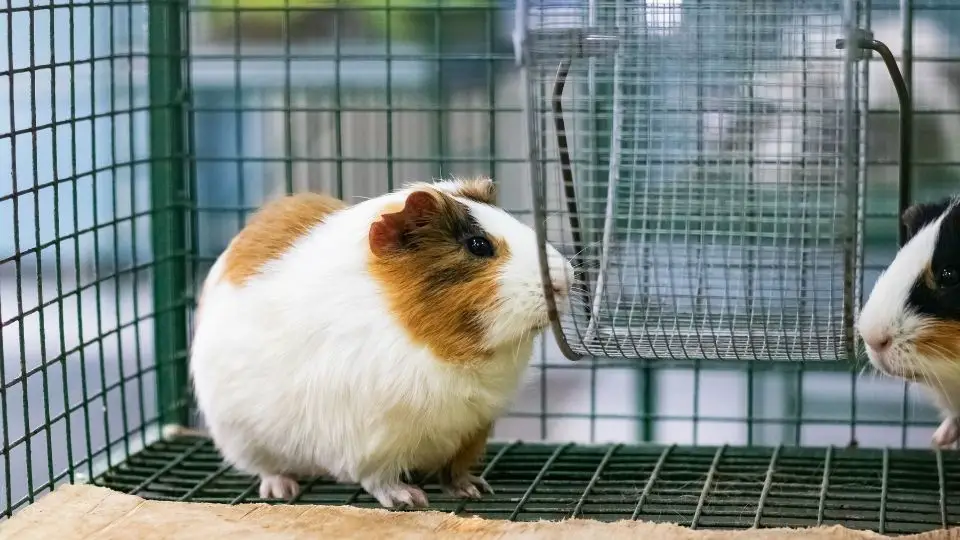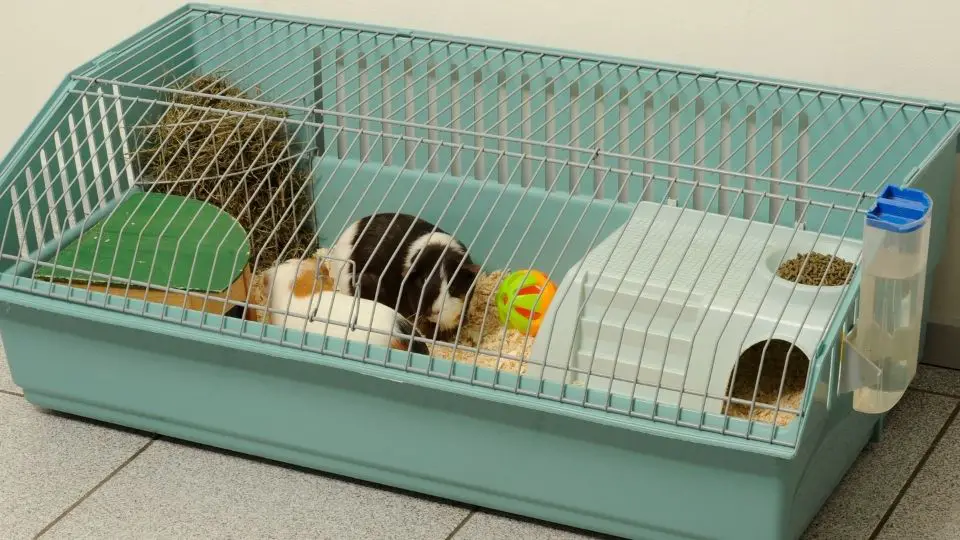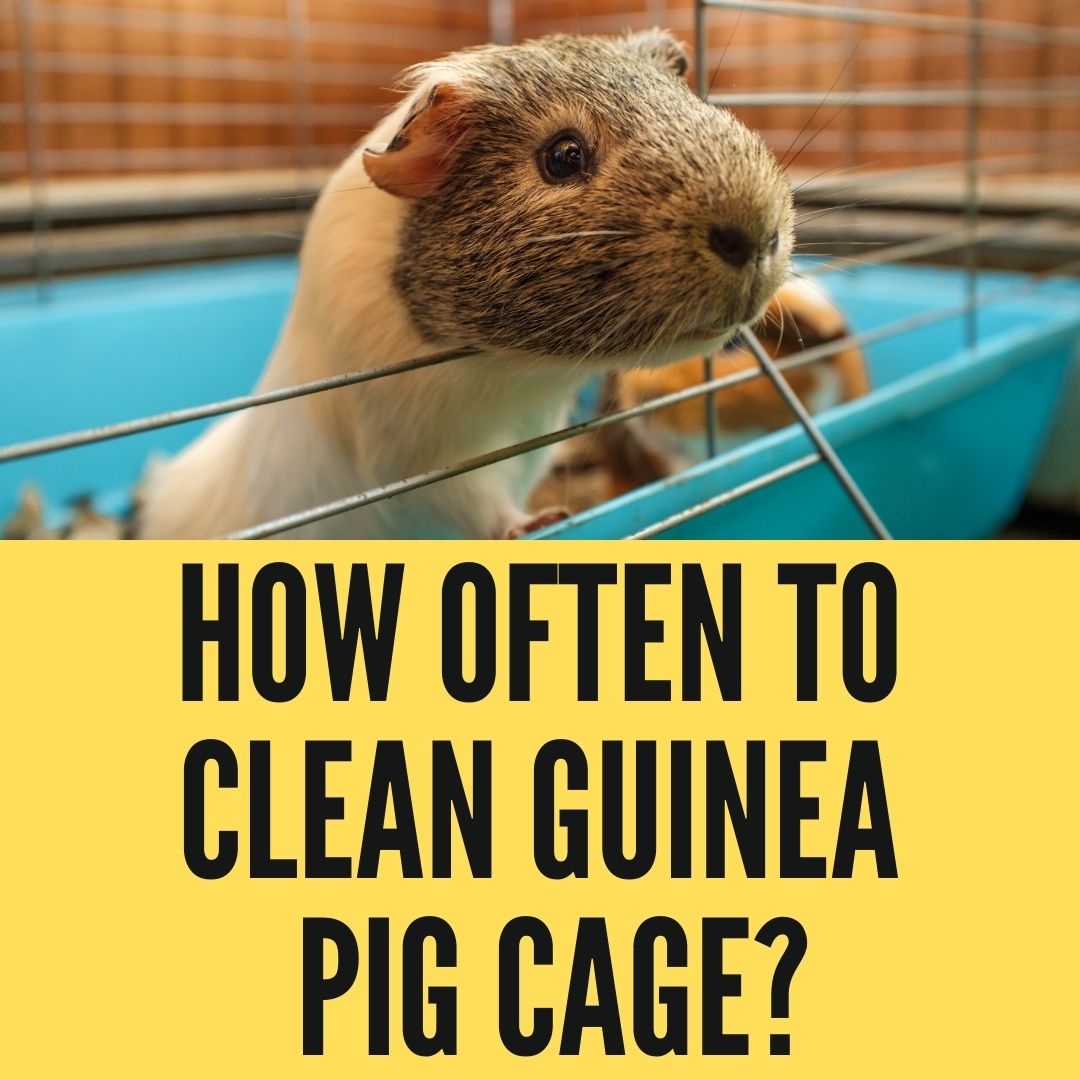Cleaning the guinea pig cage is definitely not the most delightful of activities. However, it is important that the hutch is cleaned as frequently as possible.
Not all those who agree that it is necessary to clean the cage understand the frequency of the cleaning sessions and that is going to be the focus of this piece.
Like with other pets kept at home, cleaning the cage of the guinea pig is needed to maintain optimal health status. Not keeping the environment clean and free of dirt will have inimical effects on your beloved guinea pigs.
This piece is going to shed light on the most efficient ways to have a cage cleaned, the frequency of the cleaning, and even useful hints on the ideal cage to procure so that cleaning will not be in any way difficult or stressful for you.
Contents
How Often To Clean Guinea Pig Cage?
Now is the time to answer the question that is on the minds of so many. How often should the guinea pig cage be cleared? Ideally, the cage has to be cleaned every day to remove the fecal matter. But that is not all, there should be a deeper level of cleaning every 3 to 4 days. This routine is really very important and you should not stray from it.
There is comparatively smaller fecal matter coming from the baby guinea pigs in relation to the adults.
What that means is that you should get ready to increase your rate or frequency of the removal of fecal matter as the babies transform into adults.
Some others keep a pair of guinea pigs in an expansive portion. If that is the case that applies to you, then the cage is not going to be rapidly clogged with feces.
In many instances, they tend to relieve themselves in a particular section of the hutch and that makes your everyday hygienic rounds a lot easier.
There is an exciting thing that happens with guinea pigs when you clean their cages.
They seem to really appreciate the gesture and they express that by jumping all over the place. You might want to observe your own guinea pigs too for this same behavior.

How Is Spot Cleaning Of The Cage Done?
As mentioned earlier, it is important that you clean the hutch every day by removing the feces and other material that has become contaminated with the waste material from the guinea pigs.
The flooring material you are making use of will also determine how often you get to replace it. Some materials get wet really quickly and influence how the feces are removed.
For the daily cleaning, what you do generally is to get rid of as much fecal material as possible, remove the damp material and replace it if there is the need for that. However, the thing with this daily cleaning is that it is not enough.
How Should Full Cage Cleaning Be Done?
As the daily cleaning routine is not enough, it is crucial that full cage cleaning is done every few days.
When the time comes for the full cage cleaning, there is an initial step you need to take.
Move The Guinea Pigs
You have to move the guinea pigs to a new and secure section before you commence the cleaning of the cage. Now, the new area you are going to keep the guinea pigs should be secure in every sense of it.
Do not keep them in an area where they can be attacked by other pets or even where they can escape while you are cleaning their cage.
In other words, you should have something like an alternative cage that will be the place you get to keep the guinea pigs temporarily when the time comes to do the full cage cleaning.
Once you have been able to temporarily relocate your beloved pets, the full cage cleaning process can then commence.
You initiate the process by taking away the bedding, all fecal material, dried grass, and any other item in the cage. In summary, the first step in the full cleaning process ensures there is nothing inside the cage.
All the soiled materials you removed from the cage should be properly disposed of. For keepers who use fleece for the bedding of the cage, it will be necessary to shake the cage properly so that all fur, dried grass, and other pieces are totally removed.

Water And Cleaning Agent Used
Next is a basin of water and a cleaning agent. It must be stated at this point that you should not just make use of any random cleaning agent, there are many approved and safe chemical cleaning agents that can be used.
Do not use the usual home detergents as their ingredients can be harmful to your pets. Make use of only the cleaning agents that have been specially designed to be harmless for guinea pigs and other pets.
Cleaning Wooden Cages
For the owners of cages made from wood, it will be helpful for them to get a brush so the wooden parts can be properly scrubbed.
The harder the brush, the better it will be for the scrubbing. You should take your time to ensure all the edges and corners are cleaned during the scrubbing if the hut is made up of wood.
You will need to scrub properly to get rid of all fecal materials and items that must have stuck to the sides and corners of the cage.
Cleaning Plastic Cages
But, the description in the section above is for those who have wooden cages. In some other instances, the cages are made of plastic and they have to be cleaned too.
To clean the plastic cages is also straightforward, you will need some fabric but depending on what is to be cleaned, a brush may also be needed particularly for the hard-to-reach sections like the corners. The same cleaning chemical should be used here.
You spray all over the cage and also cover the fabric with it then you commence the cleaning. Remember to use your hand gloves as you are getting all this cleaning done.
Clean all areas until everything is sparkling clean, with no remnants of fecal material or dirt remaining anywhere on the cage.
You should also have it at the back of your mind that the guinea pigs should be kept at a distance all through the period of the cleaning.
This is because the fumes of the cleaning liquid can be very harmful to them so keep them tucked away somewhere safe.
In cases where there are tiny holes (either in plastic or wooden cage), you should shake it vigorously so that all fecal material or dried grass is removed.
For cases where fleece material is used, it should be washed separately on its own.
Replace The Bedding
This is one of the most important parts of the cleaning process. You need to make sure that every single part of the hutch is thoroughly cleaned and washed.
After that, you leave the entire structure out to dry. If you do not want to wait for the drying if it is going to take long, you can hasten it by using a dry fabric to absorb water from different parts of the cage.
When the drying is done, the time has come to do the replacement of the bedding material. You get the new and neat bedding material and cover the cage.
At that stage, you can retrieve the guinea pigs from the safe location and put them back in the cage.
What Is The Best Guinea Pig Cage When It Comes To Cleaning?
Now, it is a big headache for many owners when it comes to cleaning and that is because many of them do not know the right type of structures to select.
For instance, cages are a lot easier to maintain and clean than hutches. Hutches take a longer time to clean and not everyone is well-prepared for that.
If you are wondering which guinea pig cage will make life very easy for you especially when it comes to cleaning, the Guinea Pig Habitat Plus is often recommended and you can actually check it out.
It has a cage head that is easy to remove. It is also possible to get customized fleece materials that are just for this specific cage.
Conclusion
If you want your guinea pigs to be in optimal condition, it is crucial that you clean the cages regularly.
There should be at least daily cleaning to ensure the removal of the feces and other materials. But that is not all, there has to be full cleaning done around every 72 hours.
As long as these cleaning routines are maintained and adhered to, your cute pets are going to be in perfect condition at all times.
You may also decide to check out the various alternatives on the market for cages so that you end up choosing the one that makes cleaning as easy as possible.
